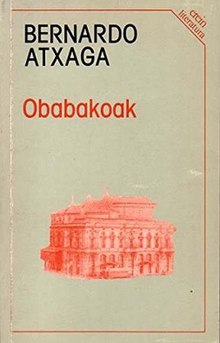Obabakoak
Obabakoak is a 1988 short story collection by the Basque writer Bernardo Atxaga. The title can be translated as "Those from Obaba". The book won the National Novel Prize.[1]
 First edition (Basque) | |
| Author | Bernardo Atxaga |
|---|---|
| Translator | Margaret Jull Costa |
| Country | Spain |
| Language | Basque |
| Publisher | Erein |
Publication date | 1988 |
Published in English | 1992 |
| Pages | 402 |
| ISBN | 8475682189 |
Themes
Atxaga described the idea behind the village Obaba: "Obaba is an interior landscape. You don't remember all the places of the past, but what sticks in the memory is this window, that stone, the bridge. Obaba is the country of my past, a mixture of the real and the emotional."[2]
Reception
Maggie Traugott of The Independent wrote: "Atxaga loves parody, riddles, manipulating texts within texts, which could of course all turn pretentious and hard-going if it weren't handled with charm and dexterity." Traugott wrote that the Basque language "has been 'hiding away like a hedgehog', fortifying itself largely on an oral tradition. Atxaga has not only awakened the hedgehog, but has brought it into the context of his own wide and idiosyncratic reading of world literature."[3]
See also
References
- "Premios Nacionales de Literatura / Modalidad Narrativa: Premiados". mcu.es. Ministry of Culture. Retrieved 2012-04-09.
- Eaude, Michael (2001-10-20). "A bridge across the great divide". The Guardian. Retrieved 2012-04-09.
- Traugott, Maggie (1992-08-30). "Waking the hedgehog". The Independent. Retrieved 2012-04-09.